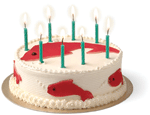Cat Care | Older Cats
Old age is not bad thing!
From advances in veterinary practices, medicine, and deeper knowledge of pet care, cats are now living longer and healthier lives. But much like humans, as cats get older they slow down a little and become more lethargic. Being aware of these natural changes, as well as how to care for an older cat, will ensure both you and them enjoy their golden years!

When is my cat considered old?
As cats enter their geriatric phase of their lives, they experience gradual changes that are very similar to how we age. Their fur will lose color, their reflexes and energy go down and hearing, eyesight and sense of smell can all be affected. The first sign of aging is a general decrease in energy, which typically happens around the age of 7. However, a healthy cat that has been spayed or neutered tends to age later on in life. Outdoor cats will age sooner, based on their tendency to be exposed to environmental factors and various illnesses.
More checkups
As your cat ages, it’s important to keep a closer eye on their health. Instead of a checkup once a year, it’s recommended to begin getting checkups every 6 months. Besides the usual checkup, your vet may perform other tests as well, including urine tests, full blood screen, and many others. If your cat goes outdoors, it’s recommended to get your cat tested for feline leukemia or immunodeficiency virus.
Work with your vet
Always let your vet know about any sudden changes in your cat’s behavior. A problem you may not assume to be an issue could be causing underlying problems that only your vet can identify. For example, your cat’s lack of physical activity may not come from a decrease in energy, but instead from arthritis or a condition that is completely treatable.
No more junk food
When your cat reaches that older stage, it’s time to make sure their diet is packing as much nutrition as possible. Sometimes, pet owners find that despite giving their cat less food, they seem to gain more weight. This is because their metabolism has slowed down, combined with less exercise. Putting on extra pounds during later stages in life can lead to debilitating conditions for your cat, such as heart, respiratory, skin and joint issues. To help your cat lose some of that excess weight, try feeding them smaller portions of food or a low calorie diet. Your vet will be able to help you make a dietary plan.
Senior Cat Tips:
-
- Make sure the food is a balance of highly palatable, digestible, and rich in potassium and taurine.
- Since food with high mineral and protein should be avoided, ask your vet about recommendations about a food type that’s right for your cat.
- Consider increasing the fiber in your cat’s diet.
- Warm food to room temperature, it’ll make the meal more appealing to older cats.
- Never feed your cat, young or old, between-meal snacks or table scraps.
Top 10 Tips for Older Cats:
-
- Take your cat to the vet twice a year
- Become knowledgeable about conditions and diseases common to older cats
- Feed them the best food you can afford, and consider many small meals a day rather than one large one
- Don’t overfeed
- Try to still have some playtime with your cat
- Watch your cat’s dental health, have teeth cleaned professionally during the semi-annual visits
- Have your vet do a risk assessment to determine appropriate vaccinations they might be missing
- Try your best to control fleas and ticks, and wash their sleeping area regularity
- Check your cat’s nails weekly and trim them as often as necessary, as older cats don’t use scratching posts as much
- Give your cat lots of love and attention and keep them always interested, active and happy!
